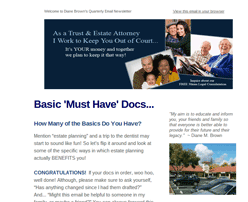Tips to Keep Seniors Safe from Financial Abuse
Categories: Elder Care, Identity Theft, Senior Scams & Fraud
 In July’s post about Elder Care – Signs of Financial Abuse, we reviewed the Red Flags that signal an increased vulnerability to financial abuse.
In July’s post about Elder Care – Signs of Financial Abuse, we reviewed the Red Flags that signal an increased vulnerability to financial abuse.
This month, we focus on what you can do and look at ways you can be pro-active and take preventative, protective actions to keep the elderly safe – financially speaking. We will also give you links to great online resources that have been created specifically with guarding the financial well-being of seniors.
Best 14 Ways to Keep Elderly Financially Safe
- Plan ahead as much as possible – If your aging parent or loved one has assets to protect or is in danger of having “just enough,” PLEASE talk to an attorney who specializes in Elder Care! Those of us who really have our client’s best interest at heart will generally offer a free consultation of some type. Meet the attorney, get some questions asked, and understand how estate planning can help protect the assets they have.
- Get checks safely into the bank – Set up Direct Deposit for all benefits checks and deposit other checks IMMEDIATELY.
- Before signing a contract – Create a plan that ensures that ANY contract your elderly loved on signs will be in the presence of you or a trusted family friend. Make sure to consult with an attorney or financial advisor before signing any financial-relate document you don’t fully understand.
- Before a BIG purchase – Prior to plunking down money on a big-ticket item (time share, investment opportunity, time-pressured offer, etc) ask that the senior you care about first run it by you or trusted family friend. These cons are crafty and know EXACTLY how to effectively part you and your money. Make it a rule of the road in their house. A big purchase is the same as a red light – you STOP at both!
- Keep things locked up – Keep valuables under lock and key – Jewelry, open credit cards, check books, financial statements (bank accounts, investment accounts, credit card accounts), medical information (Medicare, prescription plan,
- Watch the bank accounts – Keep an eye out for uncharacteristic signatures on returned checks and account withdrawal patterns that deviate from the norm.
- Donations and purchases via credit card – Let them know to never make a donation or purchase if it means they have write down their credit card information manually on a form.
- Cultivate a true ally at their bank – Along with your elderly relative, make a point of getting to know the banker most likely to keep a caring eye out for suspicious or fraudulent account activity. Build that relationship!
- Run a credit check – Check credit report once a year to keep an eye out for fraudulent activity and new, unauthorized credit lines/accounts.
- In-home and over phone sales people – Whether unsolicited or not, it is always best practice to never rush into a financial decision and insist upon getting a company’s information – in writing. Make sure your aging parent or senior loved one gets in the habit of REQUIRING a salesperson’s information FIRST.A legit person is more likely to navigate any inconvenience in order to get to their sales pitch, whereas the fraudster is more likely to make an excuse and leave. Ask for and EXPECT a business license number, printed business card and working website. Especially if the sales call or visit is unexpected, tell your senior friend to get in the habit of this: STOP IT before it starts. collect the information, and schedule a time that is “more convenient.”After the sales person is gone or off the phone make sure your elderly friend knows to call you or a trusted friend, so you can properly vet the company in question! Get details in writing. Get a second opinion!
- Shred! Shred! Shred! – Share the importance of shredding early and often! Be vigilant about shredding immediately. Shred ALL old or unwanted financial docs, credit card offers, account statements, check stubs, voided checks, and unused, preprinted deposit slips. Things like old credit cards, hard drives, CD/DVDs and prescription bottles can also be shredded by many professional services – by the box and in real time as you watch.
- Make people prove they are worthy of your trust – Fully vet in-home caregivers, cleaners, and service providers. Make sure they have been properly screened and that criminal background checks are on file.
- Report theft or financial abuse – Report it to your attorney, an officer at your bank, and law enforcement – be willing to get the needed authorities involved and report senior financial abuse to Adult Protective Services as well and help others stay safe.
- Look into a Financial Power of Attorney or Conservatorship – Do you know the ins and outs of each? If you are local, you are welcome to CLICK HERE and start with a free, 30-minute consultation.
As soon as we can, we’ll compile and share some specific resources to help you do an awesome job!
UPDATE – CLICK HERE for the List of Online Resources!
NEXT MONTH – This month there were some BIG changes re the guidelines for what constitutes a STRONG password! If you did not hear about this… you will want to have a look at our September Blog Post!
 Diane M. Brown, Esq.
Diane M. Brown, Esq.
Working every day to keep my clients out of court!
It’s your money… Let’s keep it that way!
Call 408-364-1234
This blog contains general information and is not meant to apply to a specific situation. Please seek advice of counsel before proceeding as each case is unique.






No comments yet.